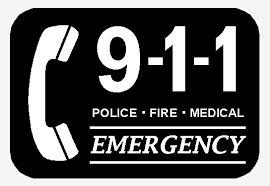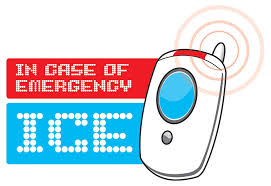Archive for ‘Medical’ Category
Vital Signs: Organizing For A Medical Emergency, Part 1
In last week’s post, I shared that I’d just had an unfortunate surprise, a trip to the emergency room (sans George Clooney) and hospitalization. The upside of being a professional organizer and blogger is that almost any situation provides useful or entertaining ideas for Paper Doll to share with her readers. (This is not to say that if the ER had provided a George Clooney doppelgänger that I wouldn’t have abandoned you all in the time it takes to say “leaving against medical advice,” but let’s leave that aside for the moment.)
Today, we’ll discuss some essentials for organizing information to help you (and first responders) during the initial moments of a medical emergency. In future posts in this Vital Signs series, we’ll talk about how to collect, organize and maintain your personal medical data to guide your doctors and make it easier for you to understand your diagnosis and follow your treatment. Further on, we’ll talk about dealing with the paperwork that comes after the medical emergency: prescriptions, appointment cards, bills, superbills (seriously, that’s what they’re called!), “explanation of benefits” statements, test results, and more.
But first, the best time to organize for an emergency is before one happens, and there are two categories of information you’ll need to get straight:
- Information you’ll need to get help, alert your loved ones and locate your doctor
- Information someone else (like a first responder) will need to ensure that no treatment causes you more harm than good
INFORMATION YOU WILL NEED
- Whom would you call first in a medical emergency?
Are you picturing a face? (Is it your mom? Maybe my mom?) A phone number? Depending on your lifestyle, an answer may not come easily. And if it’s difficult to imagine whom you’d call when you’re calmly reading a blog, imagine what a scary medical emergency might do to scramble your synapses.
Many years ago, our family doctor and his wife (a nurse) lived just down the street. When my mother fell and skinned her knees, a quick yelp brought quick help, medical proficiency and a sense of comfort. Nowadays, however, our own personal (i.e., preferred) first responders may live many streets, zip codes or states away.
Perhaps you think you’d yell for your spouse or significant other, but what if the medical emergency happened when he/she was traveling, or even across town at work? Maybe you’d call your best pal who lives just one driveway over…but what if your friend is in the carpool line at school with the cell phone turned off?
Some medical emergencies require calling 9-1-1…
but often people downplay how serious their own medical conditions might be. Sometimes we worry about “making a fuss,” fear we’d be embarrassed if a chest pain turned out to be indigestion, a racing heart “merely” a panic attack, an injured limb only bruised. Are you ever shy about getting medical help? Get over it! Know when you should call 9-1-1! Otherwise, if you are alone (either because everyone is away, or because you’re an independent singleton), call your doctor or the nearest Ask-A-Nurse call center (check with your local hospitals or insurance company), but remember that the best medical attention is the one you get when it can still do the most good.
During a medical emergency, you may be physically incapacitated; it’s also possible that the stress of the situation could keep you from thinking clearly. That’s why you need to create a plan, now, when you are healthy and clearheaded.
If you’re a parent, you’ve probably painstakingly created an emergency plan for use by babysitters, something that provides names, numbers and a hierarchy of whom to call if something goes wrong. Do the same sort of thing now. Sit down with a loved one or close friend today to create an emergency contact list to keep by the phone. (Copy these numbers into your cell phone, too.) Whom would you call first? What if they weren’t available?
- Whom would you call next?
Give yourself at least three options of people you’d absolutely call without wavering. If you’d hesitate, even for a moment, fearing “Oh, I hate to bother him/her,” then rethink the name…or your attitude.
In addition to your emergency contacts, be sure to include your numbers for:
- your physician(s)
- your doctor’s or nurse’s direct line (and/or emergency line)
- your dentist
- your 24-hour pharmacist

- Where would you need to go?
When my medical emergency struck, I called my doctor’s emergency line, and the nurse instructed me to go to the hospital’s emergency room immediately! (“Do not pass go. Go not collect $200.”) In my head, I could envision the quick route and felt competent to get there. However, although I’ve lived in the same location for over a decade, I did not realize that the emergency departments in my nearby suburban hospitals do not treat major emergencies. My nurse informed me that if I went to the local hospital, I’d just be transferred by ambulance to one of the big hospitals downtown, so I needed to head directly downtown.
In some communities, different hospitals, emergency rooms and urgent care locations specialize in different medical needs. Talk to your primary care physician or specialist to find out where’s the first place you should seek treatment for various concerns (trauma or broken bones, intense pain, signs of stroke or blood clot, heart, etc.).
Also, make sure you know which medical providers are in or out of your health insurance provider’s network. Obviously, the quality of medical care is the primary issue, but to protect your sanity and your finances, along with your health, whenever possible you should use in-network providers to ensure the majority of your emergency medical costs will be covered.
INFORMATION FIRST RESPONDERS WILL NEED
In the best case scenario, if you need to call 9-1-1, you will be alert enough to assist the professional first responders and emergency room staff with questions regarding your identity, your emergency contacts, your medical status and other pertinent information. But in case you can’t speak for yourself, organize your information to speak on your behalf.
- Who should they contact on your behalf?
By now, you should have heard of ICE, or In Case Of Emergency, the idea for which was promoted by Bob Brotchie of the UK’s East Anglia Ambulance Service and popularized via emails ever since 2004.
The idea is simple. If you are unconscious or otherwise incapacitated, first responders and others should be able to reach your most important contacts — your mom, your spouse, etc.
You merely enter the name(s) and phone number(s) of these loved ones or emergency contacts under the listing ICE in your cell phone directory; first responders and hospital staffers have been trained to look there. (Paper Doll is a big fan of listing the ICE name along with the person’s real name/nickname and phone number, like “ICE: Mom–Sheila [phone number]” or “ICE: Husband–George Clooney[phone number],” to make it easier for your loved ones to be reached. For more on the advantages and few drawbacks of the ICE program, read further here.
- What medical conditions/allergies do you have?
If you have a serious chronic medical condition like epilepsy or diabetes, it’s essential that first responders know this right away; similarly, if you are allergic to medications, bee stings or certain ingredients (like eggs), your treatment could be adversely impacted if first responders don’t have all the facts.
If you do have such a condition, you’ve already probably been warned to wear medical alert jewelry, such as a bracelet or pendant, and/or to keep a notification card in your wallet, near your driver’s license or identification card.
If you don’t already have a medical alert card in your wallet, you can make one yourself on an index card, or generate one here (just scroll down) that you can print out and tuck in your wallet.
- What drugs/medicines are you taking? In what dosages?
Next week, we’ll be talking about organizing your medical history to present it to any new doctor. But in an ambulance or the emergency room, medical professionals may not have the time or opportunity to read a lengthy history, and you may not be in a position to share what you know. It could be imperative for them to know what medicines you’re taking to ensure that standard medical procedures don’t conflict with your current regimen.
If you’re currently taking insulin, heart medications, blood thinners or other essential drugs for a chronic condition, first responders need to know ASAP. Keep a card in your wallet detailing the medicine’s names and dosages, as well as the name and number of the prescribing physician.
Note: If you have multiple health conditions and are taking a laundry list of prescribed drugs, help the paramedics help you. Keep an information sheet detailing the name(s) of your condition(s), medicines, dosages, physician and pharmacy information and contact names/numbers right on your refrigerator. To help figure out what else you might want to post, check out the free Vial of Life kit to see how it works.
I hope that neither you nor anyone you love ever experiences a medical emergency. However, as nobody ever expects a medical emergency (or the Spanish Inquisition*, for that matter), the best defense is a good offense. Just as with backing up your computer and maintaining your car, organizing your medical emergency resources is best done when you are healthy and serene. See you next week. Be safe and healthy!
*If you’re not familiar with Monty Python’s Spanish Inquisition sketch, I can’t think of anything better designed to de-stress you after thinking about medical emergencies.
Except maybe the Argument Clinic sketch or the Ministry of Silly Walks sketch. Ironically, you probably don’t want to watch the Hospital sketch.
[For more, see Vital Signs: Gathering Information During/After A Medical Emergency–Part 2.]






Follow Me